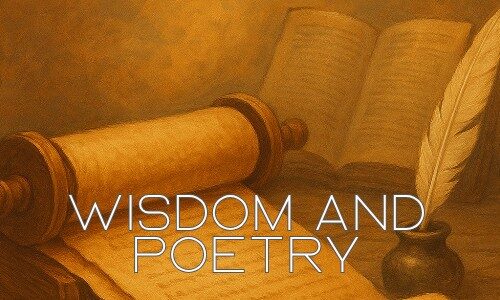This course explores the wisdom literature and poetic books of the Old Testament, including Psalms, Proverbs, Job, and Ecclesiastes. It focuses on their literary forms and theological messages about living a righteous life and understanding suffering.
Wisdom and Poetry
Level: Master’s
Course Length: 10 weeks (approx. 120–150 hours total if following full module path)
Delivery Mode: Competency-based, self-paced with required final exam
Course Overview
This course examines the wisdom and poetic literature of the Old Testament, focusing on Psalms, Proverbs, Job, and Ecclesiastes (with attention also to Song of Songs and Lamentations). Students will analyze their literary forms, historical contexts, and theological insights. Special emphasis is placed on themes of worship, wisdom, suffering, justice, and the search for meaning in life.
The course is competency-based:
-
Students may complete all modules to prepare for the final exam, or
-
If they already have sufficient background, they may skip directly to the final competency exam.
Competency is demonstrated through mastery of the content, themes, and interpretive methods of wisdom and poetic books.
Learning Outcomes
By the end of this course, students will be able to:
-
Identify the literary forms and styles of Hebrew poetry and wisdom literature.
-
Summarize the content and theological themes of Psalms, Proverbs, Job, and Ecclesiastes.
-
Interpret wisdom texts in light of ancient Near Eastern parallels.
-
Reflect theologically on biblical teaching about worship, wisdom, suffering, and human purpose.
-
Integrate insights from these books into broader biblical and theological frameworks.
Weekly Breakdown (10 Weeks)
Week 1: Introduction to Hebrew Poetry and Wisdom (8–10 hours)
-
Characteristics of Hebrew poetry (parallelism, chiasm, imagery).
-
Nature of wisdom literature in Israel and the ANE.
-
Competency: Recognize and classify Hebrew poetic structures.
Week 2: The Psalms (Part 1: Introduction & Lament) (12–14 hours)
-
Types of psalms: lament, praise, thanksgiving, royal.
-
Structure and theology of lament psalms.
-
Competency: Interpret lament psalms as expressions of faith.
Week 3: The Psalms (Part 2: Praise & Worship) (10–12 hours)
-
Hymns of praise and thanksgiving.
-
Themes of God as Creator, King, and Deliverer.
-
Competency: Explain theology of praise in the Psalms.
Week 4: The Psalms (Part 3: Royal & Messianic Themes) (10–12 hours)
-
Royal psalms and covenant with David.
-
Messianic interpretation in Jewish and Christian traditions.
-
Competency: Identify royal themes and their theological implications.
Week 5: Proverbs (Part 1: The Way of Wisdom) (12–14 hours)
-
Structure and purpose of Proverbs.
-
The fear of the Lord as the foundation of wisdom.
-
Competency: Summarize theology of wisdom in Proverbs.
Week 6: Proverbs (Part 2: Practical Wisdom) (12–14 hours)
-
Ethical themes: speech, work, relationships, justice.
-
Competency: Apply proverbial wisdom to theological reflection.
Week 7: Job (Part 1: The Problem of Suffering) (12–14 hours)
-
Prologue: Job’s suffering and heavenly challenge.
-
Dialogues with Job’s friends.
-
Competency: Explain theological questions raised in Job 1–27.
Week 8: Job (Part 2: God’s Response & Resolution) (10–12 hours)
-
Speeches of Elihu and the Lord.
-
God’s sovereignty and human limitation.
-
Competency: Analyze Job’s conclusion and theology of suffering.
Week 9: Ecclesiastes (12–14 hours)
-
Qoheleth’s search for meaning: “vanity of vanities.”
-
Themes of work, pleasure, time, and mortality.
-
Competency: Summarize Ecclesiastes’ theology of meaning and futility.
Week 10: Integration & Competency Exam Prep (10–12 hours)
-
Major themes across wisdom and poetry: worship, justice, suffering, human purpose.
-
Connections to New Testament theology.
-
Practice exam with representative texts.
-
Final Competency Exam (required).
Assessment
-
Competency Exam (100%): Students must interpret representative passages, identify literary forms, and explain theological insights.
-
Optional formative assessments: reading responses, thematic essays, and practice exegesis (not required).
Curriculum
- 10 Sections
- 19 Lessons
- Lifetime
- Week 1: Introduction to Hebrew Poetry and Wisdom (8–10 hours)Characteristics of Hebrew poetry (parallelism, chiasm, imagery). Nature of wisdom literature in Israel and the ANE.3
- Week 2: The Psalms (Part 1: Introduction & Lament) (12–14 hours)Types of psalms: lament, praise, thanksgiving, royal. Structure and theology of lament psalms.3
- Week 3: The Psalms (Part 2: Praise & Worship) (10–12 hours)Hymns of praise and thanksgiving. Themes of God as Creator, King, and Deliverer.3
- Week 4: The Psalms (Part 3: Royal & Messianic Themes) (10–12 hours)Royal psalms and covenant with David. Messianic interpretation in Jewish and Christian traditions.3
- Week 5: Proverbs (Part 1: The Way of Wisdom) (12–14 hours)Structure and purpose of Proverbs. The fear of the Lord as the foundation of wisdom.3
- Week 6: Proverbs (Part 2: Practical Wisdom) (12–14 hours)Ethical themes: speech, work, relationships, justice.2
- Week 7: Job (Part 1: The Problem of Suffering) (12–14 hours)Prologue: Job’s suffering and heavenly challenge. Dialogues with Job’s friends.3
- Week 8: Job (Part 2: God’s Response & Resolution) (10–12 hours)Speeches of Elihu and the Lord. God’s sovereignty and human limitation.3
- Week 9: Ecclesiastes (12–14 hours)Qoheleth’s search for meaning: “vanity of vanities.” Themes of work, pleasure, time, and mortality.3
- Week 10: Integration & Competency Exam Prep (10–12 hours)Major themes across wisdom and poetry: worship, justice, suffering, human purpose. Connections to New Testament theology. Practice exam with representative texts.3
Instructor

